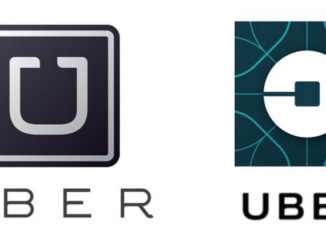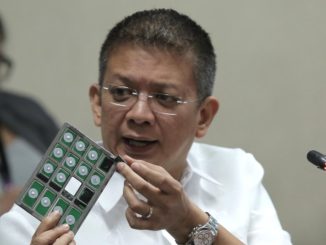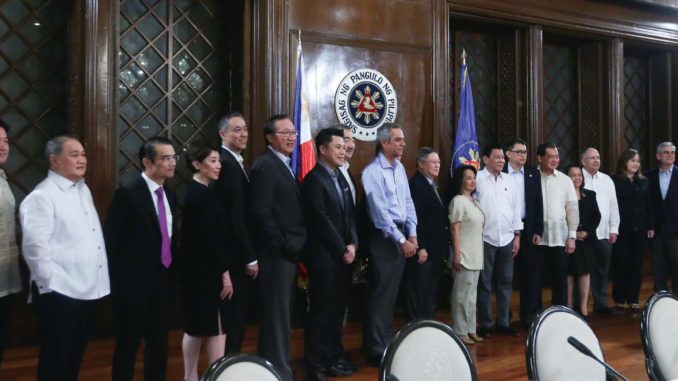
According to the World Bank, a potential software entrepreneur in Canada would take just two procedures, one and a half days and less than 1% of income per capita to start her business in Toronto.
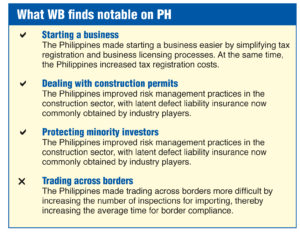 First, she would need to file for federal incorporation and provincial registration online via Industry Canada’s Electronic Filing Centre; this costs 200 Canadian dollars ($159) and is completed within a day. Second, she would need to register online for value added tax; this costs nothing and is completed within half a day.
First, she would need to file for federal incorporation and provincial registration online via Industry Canada’s Electronic Filing Centre; this costs 200 Canadian dollars ($159) and is completed within a day. Second, she would need to register online for value added tax; this costs nothing and is completed within half a day.
If the same entrepreneur were a Filipino living in Quezon City, the business incorporation process would require 13 procedures, take 31 days and cost around 20.3% of income per capita. She would need to make 14 different tax and contribution payments and visit multiple agencies in person.
Further, her business would be expected to pay 42.9% of its commercial profits in taxes and contributions annually. “Cumbersome business regulatory structures such as these constrain the ability of entrepreneurs to transform their ideas into viable businesses,” laments the 2018 World Bank study of 190 countries in ease of doing business.
One of Rodrigo Duterte’s charming qualities as president is that he hates red tape. Indeed, one distinctive quality in his nearly 23 years as mayor of Davao City is the ease with which businessmen could do business in Davao City. Walang red tape. Walang lagay.
I have yet to meet a businessman who was given a runaround or a raw deal by the Davao City government under a Duterte – the father and the daughter, Sara.
Rodrigo Duterte wanted to institutionalize the no-red tape culture nationwide. This may explain why in three years, thousands of drug addicts and drug lords died with extreme prejudice in the hands of the police (more than 4,854 as of Aug. 31, 2018). The police simply hate red tape, defined in legal circles as “due process”.
In June this year, Republic Act (RA) 11032, the Ease of Doing Business and Efficient Government Service Delivery Act of 2018, was enacted. “We are confident that this legislation will bring forward further improvements in government services, as well as make doing business easier in the country,” enthused Trade and Industry Secretary Ramon Lopez in a speech then.
Red tape and stealing
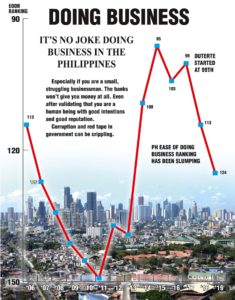 In his State of the Nation Address (SONA) July 23, 2018, President Duterte gave the same prominence to the crime of red tape as stealing money from government. He said:
In his State of the Nation Address (SONA) July 23, 2018, President Duterte gave the same prominence to the crime of red tape as stealing money from government. He said:
“While we run after those who steal the people’s money, we are also enhancing the government’s delivery of frontline services. I thank Congress for the swift passage of the Ease of Doing Business [Act], [applause] which is a significant fight against corruption and improving service delivery. We need to sustain our momentum. And I hereby direct all [local] government units — makinig sana kayo — and government agencies to faithfully implement this law and simply simplify the process. Hinihingi ko ho ‘yan sa lahat ng nasa gobyerno under my control and supervision. Huwag ho kayong magkamali.”
“I particularly call the attention of the agencies with the [most] number of red tape-related reports from the public, make your services truly customer-friendly. Our people deserve efficient, effective, and responsive government services. They deserve nothing less. [applause] Kayo lang ang ayaw eh. Gusto ng tao kayo ‘yung binabayaran, make your living from the pockets of the people, and you have a lousy and corrupt bureaucracy.”
At its monthly general meeting last July 2018, the Management Association of the Philippines tackled the newly passed Ease of Doing Business Law. The guest speaker was Department of Trade and Industry Undersecretary Rowel S. Barba.
Had you listened to Barba, you would believe that it was now so easy to do business in the Philippines. You would get a business permit in seven days. The average at present: 31 days, assuming all documents are complete. The average in East Asia: 22.7 days. The average in OECD countries: 8.5 days. The best performer in the world: New Zealand, half a day.
Quezon City is the problem
The city studied by the World Bank for the Philippine ranking– Quezon City. Well, probably outgoing Quezon City Mayor Herbert Bautista probably thinks issuing a business permit is like running a movie or TV telenovela – it comes in many series and is on an extended run.
That speed ranks the Philippines No. 124th among 190 economies studied by the World Bank’s 2019 survey of ease of starting a business. This means the country is below average or an abject failure. Which means if you want to start a business here, you simply cannot start it, because of red tape.
If red tape is all about graft, then the Philippines would be one of the most corrupt countries in ASEAN.
SEC also a problem
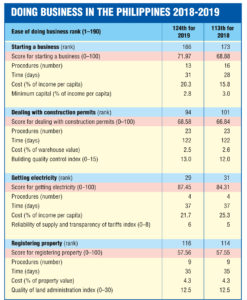 Take the Securities and Exchange Commission. The SEC is the oldest SEC in Asia. Its age shows. It takes from two months to eight months to incorporate, which means your capital lies idle in a bank while the SEC takes its time registering your articles of incorporation. You cannot collect because strictly, you are not a legal personality.
Take the Securities and Exchange Commission. The SEC is the oldest SEC in Asia. Its age shows. It takes from two months to eight months to incorporate, which means your capital lies idle in a bank while the SEC takes its time registering your articles of incorporation. You cannot collect because strictly, you are not a legal personality.
It takes SEC at least two weeks to release your certified true copy of articles of incorporation. (See related article, pages 24-17)
Why have things suddenly slowed down at the SEC? Well, they tried to computerized. Because they computerized, so many people started to do business with the SEC thinking things have improved.
Instead of improving, the system at SEC bogged down. So everyone has to have the patience while waiting for Godot. Thanks to SEC’s slowpoke computers and software that is full of errors.
I am sure SEC won’t learn about my complaint. Why? Because its system is not programmed to accept complaints. You cannot complain to God, can you?
Meanwhile, “The relief promised by the Ease of Doing Business and Efficient Government Service Delivery Act of 2018 (Republic Act 1102) to people who do business with government offices may suffer additional delay, said Raul Palabrica in his Inquirer column Oct. 30, 2018.
Although the Department of Trade and Industry, the lead agency in drafting the implementing rules and regulations, was able to submit on time the proposed IRR to the Office of the President, it was not released because the body authorized to issue it, the Anti-Red Tape Authority (ARTA), has not been organized. Deadline was last Oct. 22, 2018.
To-date, President Duterte has not appointed any of the ARTA officials, notes Palabrica.
The 2019 World Bank’s Ease of Doing Business Report ranked the Philippines 124th among 190 economies, a drop 25 rungs from its 99th in 2017.
In contrast, our Asean neighbors rank much higher: Singapore, 1st; Malaysia, 24th; Thailand, 26th; Vietnam, 68th; and Indonesia, 72nd.
As a result, these countries are able to draw billions of dollars worth of investments that create thousands of job opportunities.
— Tony Lopez


